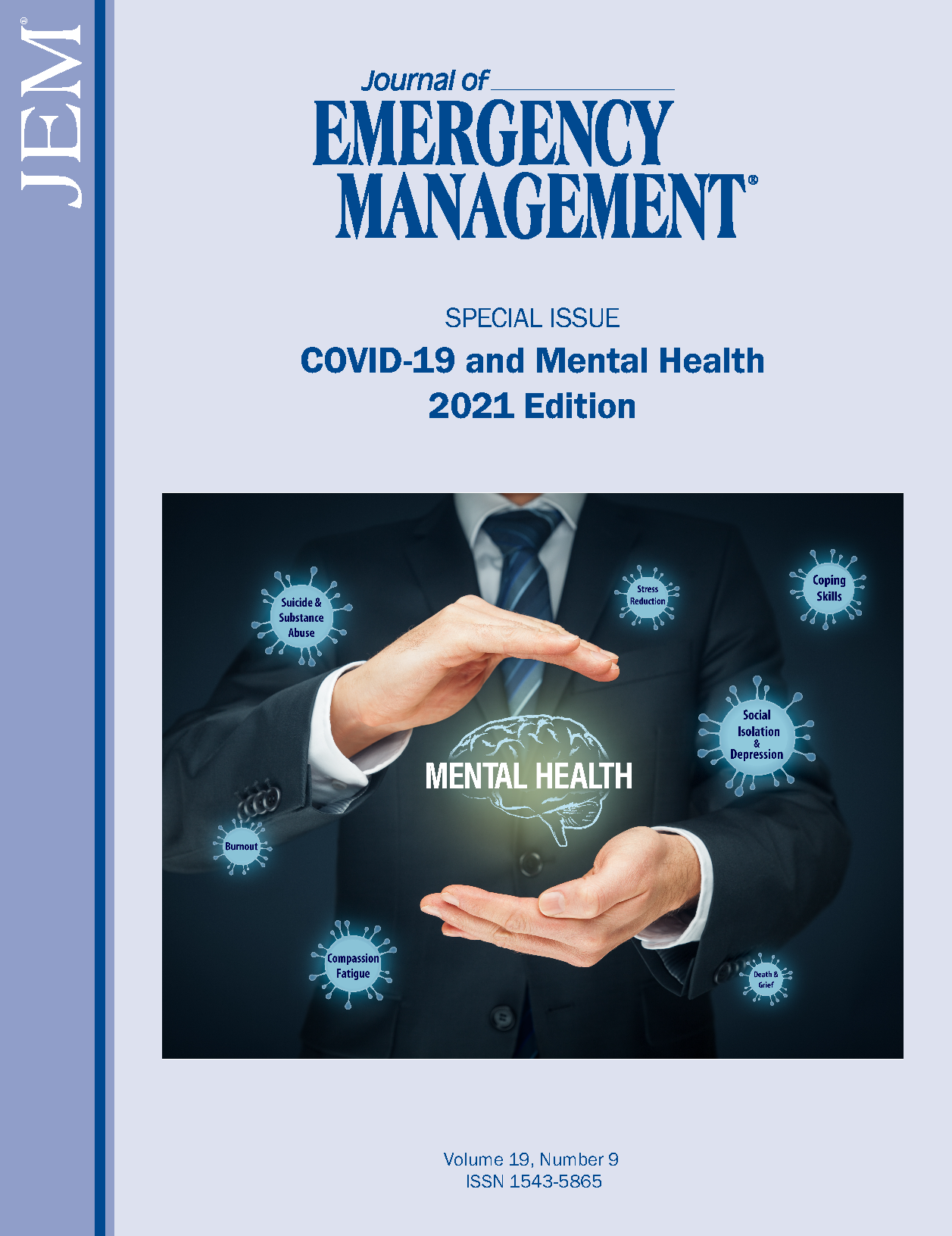COVID-19 and Asian American college students: Discrimination, fear, and mental health
DOI:
https://doi.org/10.5055/jem.0598Keywords:
Asian American, college student, COVID-19, fear, health, racial discriminationAbstract
Introduction: Our research addressed double victimization among Asian Americans by COVID-19 and anti-Asian racial discrimination during the pandemic. Guided by the Vulnerable Populations framework that argues that health status reflects the dynamic interplay between resource availability and relative risk, we investigated time-sensitive questions that explored relative risk (perceived racial discrimination, fear of COVID-19), resources (COVID-19 prevention knowledge, resilience), and mental health status (post-traumatic stress disorder (PTSD), depression) in Asian American undergraduate and graduate students during the pandemic.
Methods: A mixed-methods research was conducted to examine the relationships among the relative risk, resources, and mental health outcomes in this population. We adapted questions from valid and reliable measures to assess key variables. Descriptive and regression analyses along with content analysis were used to analyze the quantitative and qualitative data.
Results: Our sample included 74 Asian American students (AA students) who participated in the online survey (53 complete cases were included in the statistical analysis) and an additional 10 AA students who were interviewed via Zoom. The results of hierarchical regression models confirmed a positive association between fear of COVID-19 and both mental health outcomes (PTSD and depression), and a negative association between COVID-19 prevention knowledge and mental health outcomes. Perceived racial discrimination was significantly and positively associated with PTSD and depression while controlling for sociodemographic variables. However, its association with outcomes diminished when fear of COVID-19 and COVID-19 prevention knowledge were added to the models. Our interview results supported the survey findings with more nuanced details not revealed in the survey.
Conclusion: The findings of this research will help public health officials and universities identify practices useful for promoting culturally congruent safety and protection in response to pandemics and other health emergencies.
References
John Hopkins Coronavirus Resource Center: COVID-19 dash¬board by the Center for Systems Science and Engineering (CSSE) at Johns Hopkins University (JHU). Available at https://coronavirus.jhu.edu/map.html. Accessed March 28, 2021.
Centers for Disease Control and Prevention: Cases in the US. Available at https://www.cdc.gov/coronavirus/2019-ncov/cases-updates/cases-in-us.html. Accessed March 28, 2021.
Centers for Disease Control and Prevention: COVID-19 in racial and ethnic minority groups. Available at https://www.cdc.gov/coronavirus/2019-ncov/need-extra-precautions/racial-ethnic-minorities.html. Accessed March 19, 2021.
Flaskerud HJ, Winslow JB: Conceptualizing vulnerable populations health-related research. Nurs. Res. 1998; 47(2): 69-78.
United States Census Bureau: 2014-2018 American Community Survey (ACS) 5-year Public Use Microdata Sample (PUMS). Available at https://data.census.gov/mdat/?#/search?ds=ACSPUMS5Y2018. Accessed March 20, 2021.
Liu Y, Finch BK, Brenneke SG, et al.: Perceived discrimination and mental distress amid the COVID-19 pandemic: Evidence from the understanding America Study. Am J Prev Med. 2020; 59(4): 481-492.
Berger M, Sarnyai Z: “More than skin deep”: Stress neurobiology and mental health consequences of racial discrimination. Stress. 2014; 18(1): 1-10.
Chen ACC, Keith VM, Airriess C, et al.: Economic vulnerability, discrimination, and Hurricane Katrina: Health among Black Katrina survivors in Eastern New Orleans. J Am Psychiatr Nurses Assoc.2007; 13(5): 257-266.
Chen ACC, Keith VM, Leong KJ, et al.: Hurricane Katrina: Prior trauma, poverty and health among Vietnamese-American survivors. Int Nurs Rev. 2007; 54(4): 324-331.
Cheah CSL, Wang C, Ren H, et al.: COVID-19 racism and men¬tal health in Chinese American families. Pediatrics. 2020; 146(5): e2020021816.
Devakumar D, Shannon G, Bhopal SS, et al.: Racism and discrimination in COVID-19 responses. Lancet. 2020; 395(10231): 1194.
Constante, A: Why the Asian American COVID data picture is so incomplete. Undertesting, stigma and a lack of disaggregated data have complicated the depiction of how the pandemic is affecting AAPIs. NBC News. October 20, 2020. Available at https://www.nbcnews.com/news/asian-america/why-asian-american-covid-data-picture-so-incomplete-n1243219. Accessed March 29, 2021.
Fighting Hate for Good: Reports of anti-Asian assaults, harass¬ment and hate crimes rise as coronavirus spreads. Available at https://www.adl.org/blog/reports-of-anti-asian-assaults-harass-ment-and-hate-crimes-rise-as-coronavirus-spreads. Accessed March 22, 2021.
Jeung R, Yellowhorse A, Popovic T, et al.: Stop AAPI Hate National Report. Available at https://secureservercdn.net/104.238.69.231/a1w.90d.myftpupload.com/wp-content/uploads/2021/03/210312- Stop-AAPI-Hate-National-Report-.pdf. Published March 2021. Accessed March 19, 2021.
Tausen BM, Jin J, Kim PY, et al.: Academic community support, campus racial climate, and subjective well-being during the coronavirus outbreak among Asian American college students. J Asian Am Stud. 2020; 23 (3): 367-385.
Cohen A, Hoyt L, Dull B: A descriptive study of COVID-19–related experiences and perspectives of a national sample of college students in spring. J Adolesc Health. 2020; 67(3): 369-375.
Browning M, Larson L, Sharaievska I, et al.: Psychological impacts from COVID-19 among university students: Risk factors across seven states in the United States. PloS One. 2021; 16(1): e0245327.
Harris PA, Taylor R, Thielke R, et al.: Research electronic data capture (REDCap) – A metadata-driven methodology and workflow process for providing translational research informatics support. J Biomed Inform. 2009; 42(2): 377-81.
Boas T, Christenson D, Glick D: Recruiting large online samples in the United States and India: Facebook, Mechanical Turk, and Qualtrics. Political Sci Res Methods. 2020; 8(2): 232-250.
Strickland JC, Stoops WW: The use of crowdsourcing in addiction science research: Amazon Mechanical Turk. Exp. Clin. Psychopharmacol. 2019; 27(1): 1-18.
Mortensen K, Hughes TL: Comparing Amazon’s Mechanical Turk platform to conventional data collection methods in the health and medical research literature. J Gen Intern Med. 2018; 33(4): 533-538.
Difallah D, Filatova E, Ipeirotis P: Demographics and dynamics of Mechanical Turk workers. Conference Proceedings of the Eleventh ACM International Conference on Web Search and Data Mining. February 2018; 135-143. Marina Del Rey, CA. Available at DOI:10.1145/3159652.3159661. Accessed March 20, 2021.
Walters K, Christakis DA, Wright DR: Are Mechanical Turk worker samples representative of health status and health behaviors in the US? PloS one. 2018; 13(6): e0198835.
Yank V, Agarwal S, Loftus P. et al.: Crowdsourced health data: Comparability to a US National Survey, 2013–2015. Am J Public Health. 2017; 107(8): 1283-1289.
Conover KJ, Israel T: Microaggressions and social support among sexual minorities with physical disabilities. Rehabil Psychol. 2019; 64(2): 167.
Lemaster P, Pichayayothin N, Strough J: Using Amazon’s Mechanical Turk to recruit older adults: Easy and cheap, but is it valid? Gerontologist. 2015; 55(Supplement 2): 469.
Thompson SR: Racial Microaggressions Cohort Differences [College of Arts & Sciences Senior Honors Theses]. Louisville, KY: University of Louisville, 2019.
Springer VA, Martini PJ, Lindsey SC, et al.: Practice-based considerations for using multi-stage survey design to reach special popula¬tions on Amazon’s Mechanical Turk. Survey Practice. 2016; 9(5): 1-8.
Leong KJ, Airriess CA, Chen ACC, et al.: From invisibility to hypervisibility: The complexity of race, survival, and resiliency for the Vietnamese American community in Eastern New Orleans. In Bates K, Swan RS (eds.): Through the Eye of Katrina, Social Justice in the United States. 1st Edition. Durham, NC: Carolina Academic Press, 2007: 169-186.
Leong KJ, Airriess CA, Li W, et al.: Resilient history and the rebuilding of a community: The Vietnamese American community in New Orleans East. J Am Hist. 2007; 94(3): 770-779.
Li W, Airriess CA, Leong KJ, et al.: Vietnamese Americans in New Orleans East: From Vietnamese village to Asian quarter? In: Rivera DJ, Miller DS (eds.): How Ethnically Marginalized Americans Cope with Catastrophic Disasters: Studies in Suffering and Resiliency. Lewiston, NY: Edwin Mellen Press, 2010: 109-129.
Molero F, Recio P, García-Ael C, et al.: Measuring dimensions of perceived discrimination in five stigmatized groups. Soc Indic Res. 2013; 114(3): 901-914.
Ahorsu DK, Lin CY, Imani V, et al.: The fear of COVID-19 scale: Development and initial validation [published online ahead of print, 2020 Mar 27]. Int J Ment Health Addict. 2020; 1-9. DOI:10.1007/s11469-020-00270-8.
Tzur Bitan D, Grossman-Giron A, Bloch Y, et al.: Fear of COVID- 19 scale: Psychometric characteristics, reliability and validity in the Israeli population. Psychiatry Res. 2020; 289: 113100.
Centers for Disease Control and Prevention: Coronavirus dis¬ease 2019 (COVID-19): How to protect yourself & others. Available at https://www.cdc.gov/coronavirus/2019-ncov/prevent-getting-sick/prevention.html. Accessed March 28, 2021.
Connor KM, Davidson JRT: Development of a new resilience scale: The Connor-Davidson Resilience Scale (CD-RISC). Depress Anxiety. 2003; 18(2): 76-82.
Jung YE, Min JA, Shin AY, et al.: The Korean version of the Connor-Davidson Resilience Scale: An extended validation. Stress Health. 2012; 28(4): 319-326.
Meng M, He J, Guan Y, et al.: Factorial invariance of the 10-Item Connor-Davidson Resilience Scale across gender among Chinese elders. Front. Psychol. 2019; 10: 1237.
Kroenke K, Spitzer RL, Williams JBW: The PHQ-9: Validity of a brief depression severity measure. J Gen Intern Med..2001; 16: 606-613.
Chen ACC, Szalacha L, Menon U: Perceived discrimination and its associations with mental health and substance use among Asian American and Pacific Islander undergraduate and graduate students. J Am Coll Health. 2014; 62(6): 390-398.
Keum BT, Miller MJ, Inkelas KK: Testing the factor structure and measurement invariance of the PHQ-9 across racially diverse US college students. Psychol Assess. 2018; 30(8): 1096-1106.
Prins A, Bovin MJ, Smolenski DJ, et al.: The Primary Care PTSD Screen for DSM-5 (PC-PTSD-5): Development and evalu¬ation within a veteran primary care sample. J Gen Intern Med. 2016; 31(10): 1206-1211.
Jung Y, Kim D, Kim W, et al.: A brief screening tool for PTSD: Validation of the Korean version of the Primary Care PTSD Screen for DSM-5 (K-PC-PTSD-5). J Korean Med Sci. 2018; 33(52): e338.
Kroenke K, Spitzer RL, Williams JBW: The PHQ-15: Validity of a new measure for evaluating somatic symptom severity. Psychosom Med. 2002; 64: 258-266.
Wang D, Gee GC, Bahiru E, et al.: Asian-Americans and Pacific Islanders in COVID-19: Emerging disparities amid discrimina¬tion. J Gen Intern Med. 2020; 35: 3685-3688.
Asian Americans Advancing Justice: 2020 Asian American voter survey (National). Available at https://aapidata.com/wp-content/uploads/2020/09/aavs2020_crosstab_national.pdf. Accessed March 28, 2021.
National Institutes of Health: National Institute on Minority Health and Health Disparities (NIMHD). Available at https:// www.nih.gov/about-nih/what-we-do/nih-almanac/national-insti-tute-minority-health-health-disparities-nimhd. Accessed March 28, 2021.
Qasim S: How racism spread around the world alongside COVID-19. World Economic Forum. Available at https://www.weforum.org/agenda/2020/06/just-like-covid-19-racism-is-spreading-around-the-world/. Published June 05, 2020. Accessed March 29, 2021.
Downloads
How to Cite
Issue
Section
License
Copyright 2007-2023, Weston Medical Publishing, LLC and Journal of Emergency Management. All Rights Reserved








